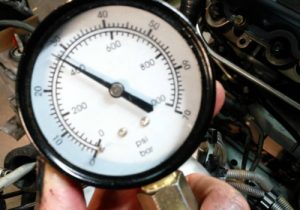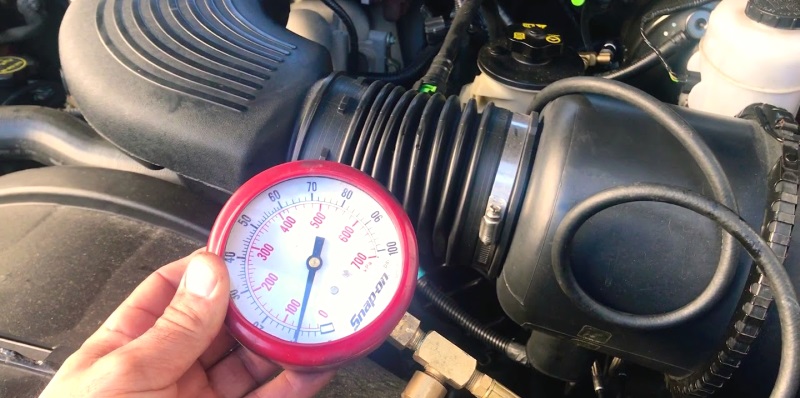About low engine fuel pressure:

Fuel pressure is usually tested with a pressure gauge
The fuel pump is responsible for sending fuel to your car’s fuel injectors where it enters your engine and provides your car with energy. Low fuel pressure occurs when the fuel pump is not sending fuel with enough force. This ultimately results in a decrease of fuel entering the engine.
Learn more about how the fuel pump works >
When low fuel pressure occurs, your engine can be starved of fuel. This will result in a noticeable decrease in engine horse power, as well as several other symptoms associated with a lean fuel mixture.
Causes of engine low fuel pressure
Many people are quick to blame the fuel pump when low pressure occurs, however, there are a lot of different components that can cause low fuel pressure when malfunctioning.
Failing fuel pressure regulator – The fuel pressure regulator helps to control the amount of fuel that is entering the engine. If it fails, you may experience low fuel pressure. If this is the case then your fuel pressure regulator will need to be replaced in order to fix the fuel pressure issue.
Fuel leaks – A leak in your car’s fuel system can reduce pressure and prevent the right amount of petrol or diesel from reaching your engine. Fuel leaks can be diagnosed by looking for puddles of petrol or diesel under your vehicle.
Failed fuel pump relay / wiring – Newer fuel pumps are mostly electric. This means that they are controlled by wiring and a relay and often the engine computer. If any of these connections / systems fail, the fuel pump will stop working.
Blocked fuel filter / fuel lines – Over time, the fuel filter and fuel lines can become blocked by contaminants, limiting the flow of petrol or diesel to your engine.
Faulty fuel pump – The fuel pump can malfunction, limiting or completely cutting of the fuel flow to the engine. Sometime the fuel pump in tank filter can become blocked, or the fuel pump can start to slow down as the electric fuel pump motor wears out.
Low engine fuel pressure symptoms:
Reduced engine power – Incorrect fuel pressure can result in incorrect engine running conditions. You may notice that your car struggles to go up hills, reach higher speeds or has little power in higher gears. It may also stall when the accelerator is pressed down.
Check engine light – When the engine’s Oxygen sensors detect a change in air/fuel levels, the check engine light can turn on.
Whining noise – One of the first symptoms of a faulty fuel pump is a loud whining noise that can be heard while driving.
Car not starting – In severe cases, your car may struggle to start or not start at all. A certain amount of fuel must enter your engine in order for the ignition process to take place. If there is little/no fuel due to low pressure, the engine will not start. Sometimes tapping the fuel tank is enough to get a stuck fuel pump and your engine running again.
Sometimes car electric fuel pumps will stop and start intermittently.
Low Engine Fuel Pressure – Diagnostics & Replacements in Hamilton
Does your car have low fuel pressure? If so, we can help!
At Grimmer Motors, we specialise in car diagnostics. This means that we can use our advanced equipment to read the air/fuel levels and fuel pressures in your engine and detect the causes of low fuel pressure. Once we have diagnosed the issue, we can provide effective replacements that will last the test of time.
For fast, reliable, quality fuel system fixes and replacements in Hamilton, contact Grimmer Motors today!

